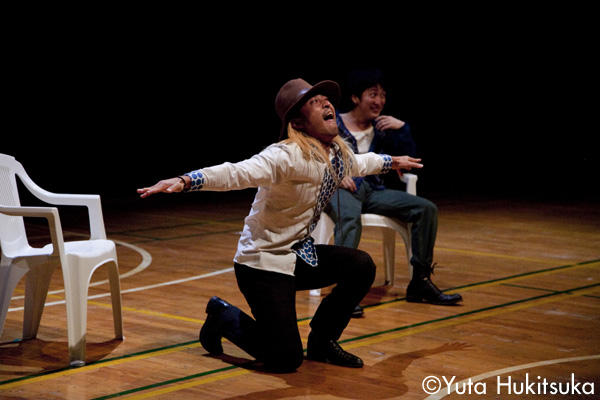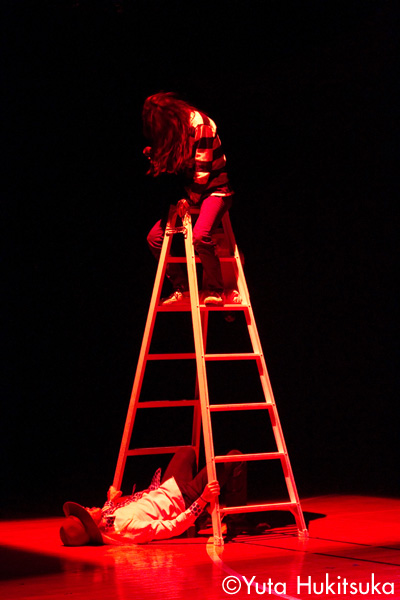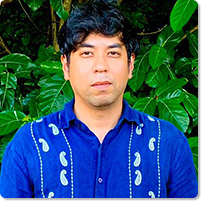We see an empty stage with its rear half consumed in darkness. Many of the actors’ entrances and exits are made from this darkness.
Man 2 and Man 3 make their entrance carrying chairs and laughing jollily as they come. With lazy, sloppy gestures they blurt out challenging questions at the audience. They complain about how they immigrated to this country full of hope only to become the object of discrimination, how they have been forced to assimilate in their hopeless situation, the discord caused by trying to carry on the traditions of their native country, and the marriage and starting families with women of their adopted country in order to secure a position in it.
After these two leave the stage, Man 1 makes his entrance from the audience side wearing a suit with a backpack on his back. Staggering badly he peers into the darkness and finally goes down on his knees. He takes out a plastic bottle of water and drinks from it. When it’s empty, he lifts it high over his head as if to dash it to the ground with frustrated anger, but in the end he stops himself and tosses it lightly off into the darkness. Now on all fours, Man 1 has become one of the “cattle” and raises his rear end to fart.
Man 2 appears again and ridicules Man 1, who continues his insecure mumbling as a cow.
Woman 1 appears and cuddles up with Man 1. Together they drink water, throw the bottle away and then fart.
Man 2 carries in a television and puts it in front to Man 1 and Woman 1, calling it “feed.” On the screen we see scenes of grassy fields and blue skies. Saying he is going to poison the feed, Man 3 changes the channel to a professional fight program.
Eyeing Woman 1 lustfully, Man 3 starts to pick on Man 1. As he changes the channel, Man 3 asks Man 1 to explain the things that show up on the screen, the “Dark Matter,”
gyudon
(boiled beef on rice) and Napoleon, but the two fail to make any meaningful conversation.
Man 3 tells Man 1 to do something Japanese that is funny. Man 1 does an impersonation of Yoko Ono. Man 3 amuses himself by acting like he is having sex disguised as John Lennon. Singing the “Gyudon Song,” Man 3 leads Man 1 off into the darkness as he continues to mumble things about death. Then Man 3 return alone and begins to talk about the Dark Matter.
With an exceptional use of bodily gestures, Woman 1 talks about how she disliked the increasing number of immigrants but ended up giving birth to an immigrant’s child.
Man 2 comes up on Woman 1 and Man 3 from behind as they sit in front of the television, and he introduces them as his parents. Man 2 is a second-generation immigrant. Man 2 begins to eat his meal alone and is scolded by Woman 1 for his table manners. Man 2 announces that as a bi-ethnic second-generation immigrant he is going to found his own country.
Amid this commotion, Man 3 awakes from his nap and becomes the “King of Japan” floating in the air. Between the two of them, Man 3 as King and Man 2 rewrite the history of Japan. The erase from that history the Immigrant Day and the attack on Pearl Harbor, they verify that Japan was actually located in Louisiana and that it has a “single child policy,” etc. Then the three perform the ritual of drinking water, throwing away the plastic bottle and farting.
Man 1 makes a new appearance, this time as an oppressive American. He ridicules the new history of Japan that has been fabricated and treats the other three in a discriminatory way as “cattle.” Man 1 forces Woman 1 to have sex with him. After reaching sexual climax, he leads Man 3 in his “cattle” embodiment off into the backstage darkness.
Man 2 remain alone on the stage. “Now it is my turn to uphold our bloodline,” he says and proceeds to repeat the meal and manners scene. He makes an appeal for the plight of second-generation immigrants and their lost identity, due to the fact that they are pureblooded but still considered to be foreign Japanese.
However, he returns once again to his jesting, uncommitted self and becomes cattle together with Man 1 and 3 and Woman 1 who have returned to the stage. Later, alone on the stage again, Man 2 drinks water, throws the plastic bottle and farts. He states that farting into the darkness gives him a slightly larger place of his own, and that in itself is his will and his hope. Then he disappears into the darkness backstage.
The stage lights go out.
When the lights come on again, Woman 2 is standing there barefoot. Behind her, darkness grows in a hemispherical shape.
Woman 2 begins a poetic monologue.
“I wanted children. But, I drank the water. I drank the water and let it all flow* to the end. I let it flow until all was forgotten. I wanted children.”
(*flow (nagasu) in Japanese having the combined meanings of accept, forgive and forget as well as to miscarriage)
The lights go out.




